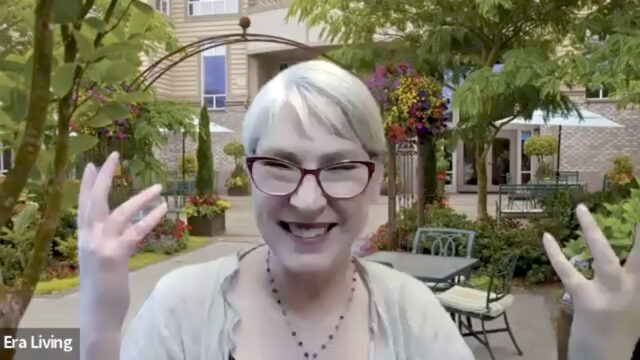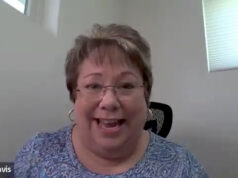Suzanne: And welcome back everyone to Answers for Elders Radio Network, heard across the USA. And we have had an amazing hour talking about planning for the future. And those of you that are in their late sixties, early seventies, mid-seventies, if you haven’t thought about your next chapter in life, we encourage you to start thinking about it. And if you think that you might want to explore the idea of senior living, there’s all types of ways, and considerations, that you have to look at in order to see if you’re a fit, or if bringing in help to the home is more preferable to you. Either way, there’s a lot of planning, and the more planning that you can do in advance, the more peaceful it is through the process.
And we are very, very glad to have our wonderful guest, my friend Tina Hall from Era Living in the greater Seattle area. And Tina, thank you, first of all, for sharing your wisdom with us this hour. I know that this hour is almost up, it’s crazy. But I want to talk about a little bit about the questions to ask. We have talked about it, when you’re touring a community, and when you’re doing your research, what are key questions that someone should be asking?
Tina Hall: So there are several questions. I’m gonna try to hit on some of the most important ones I would ask first and foremost. If you can, see a copy of their most recent state survey. Now in Washington State, DSHS is a regulatory body that comes in and, and inspects communities every year and they’re looking for any types of issues or violations to the rules of how you are supposed to be operating your communities.
Suzanne: And we learned from you, there’s 178 of them in Washington State. I learned that yesterday from your Director of Nursing.
Tina Hall: So you wanna know that the care is good. You want to know that they’re doing what they should, they’re providing care the way they’re supposed to be. They’re protecting your dignity, they’re not making mistakes, you know, they’re doing things right.
You also want to know how long has your staff been here. You know, what is your turnover rate? The reason it’s important is because, if you have staff that has longevity, they’re better trained, they’re going to know you better as you live there. They’re just going to have a better relationship with their residents, with each other, and a stronger knowledge base, and you know that there’s gonna be the same person coming in to provide care on a regular basis. It’s not gonna be a different person every time because they’re turning over. So that’s important to consider,
Ask about the food. What are the meal hours? How are the menus designed? Food is a big deal. If you’re gonna be taking your meals there, you want to know that that food is good. You wanna try a meal, maybe two.
You also want to ask about some of the other residents, and the activities, because you want to make sure that there are people there that you are going to enjoy being around, you’re going to enjoy their company.
Let’s see, other things, you obviously want to ask about costs. You want to ask, do you accept Medicaid as a form of payment should I run out of money? A lot of the times it’s gonna be no, unless you are in a very rural location, but it’s worth asking anyway. It might not apply to you, but it’s good to know, right? You wanna ask, oh my gosh. I have so many things in my brain!
Suzanne: Well, what type of care options do you have? So for example, if you have assisted living, what if you get to a point where you can’t transfer from bed to chair? Can you provide that service for me? What if I have a stroke, and I need special care? Can you bring care from the outside?
Tina Hall: And what are your move out triggers? If I have something that happens to me, and you can no longer provide care, what are my options, will I have to move? How high a level of care can you provide? Do you have memory care if I need to move to a memory care wing, if I have progressive dementia? These are really essential questions to ask. Do you have flexible licensing? What happens if my spouse needs assisted living? Do they have to move, or what if I do? Do I have to move to a different area of the building. This seems like, oh, you’re just moving from one wing in the building to the other. But do you want to go through that? Probably not.
Suzanne: Right. And here’s the other thing, what about your family? How involved can my family members be with me? How do I keep my family interacting? What are ways that I can keep my family members informed of different things like that, those are all good questions to ask.
Tina Hall: Will your family be involved in care conferences when things change? Can your family come in and join you for a meal or for resident activities? How engaged can they be? Because oftentimes we want our family to be able to come in.
Suzanne: Tina, I have to say, when my mom ran out of money and she was on Medicaid, nothing made her happier than to have me for lunch. Because she was on Medicaid, I would buy my own lunch, but that was fine, but she felt like she could host me. It was a great way of giving her dignity, of not feeling like she’s a charity case. “Please come in and sit down,” and I think that’s one of the things that’s that communities like yours do so well, welcoming family and making sure that our seniors have their utmost dignity, no matter what their financial situation is. And I think that’s one of the things we should really talk about too.
Tina Hall: Keeping people connected to each other — we are humans that need connection. We are social creatures. And so having that engagement with our families, with people around us, with the world, with our activities, the things that we care about, these are vital for healthy aging. We don’t want to be bored and alone, for sure. We want to be actively engaged in life. Right. As long as we can.
Suzanne: That is so absolutely true, and living here in Greater Seattle, all of your communities are beyond amazing. I have seen so many things that you do with your residents, and how you are connecting with them. It’s such a joy to come into your communities because one of the things I always notice is when I walk in through your doors, you see people smiling, they’re happy. You know, you don’t always see that in communities, but yours, they’re having fun, they are enjoying life. And I think that that’s just the coolest thing in the world. But Tina, I am so grateful to have you on the show this week. Thank you so much for being a part of our program.
Tina Hall: Absolutely. Thank you for having me, Suzanne.
Suzanne: So each and every one of you, you can reach Tina through her website at eraliving.com.














